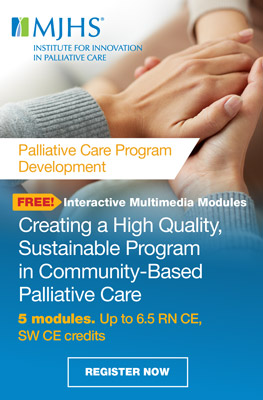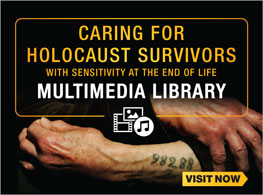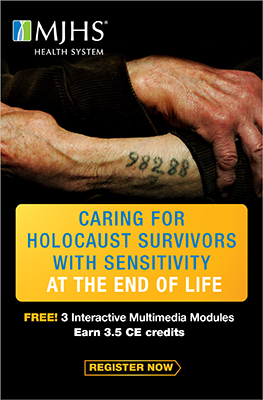Hospice & Palliative Care
ONLINE CONTINUING EDUCATION
Learn Anytime. Earn Credits. Improve Practice.
Cystic Fibrosis Palliative Care Series
11 FREE on-demand webinars on palliative care in Cystic Fibrosis (CF)
Cystic Fibrosis Palliative Care Series 10.25 Credits

Amanda Bruce, PhD
Licensed Clinical Psychologist
Assistant Professor
University of Kansas Medical Center
Elisabeth Dellon, MD, MPH
Medical Director, UNC Children’s Supportive Care Team
Professor of Pediatrics
University of North Carolina School of Medicine
Stephanie Filigno, PhD
Clinical Psychologist, Cincinnati Children’s Medical Center
Associate Professor of Pediatrics
University of Cincinnati College of Medicine
Co-director, Cincinnati Children's Hospital Medical Center
Cystic Fibrosis Center Behavioral Health Program
Anna Georgiopoulos, MD
Consulting Psychiatrist
Cystic Fibrosis Program
Massachusetts General Hospital
Harvard Medical School
Myra Glajchen, DSW, MSW, BSW, ACSW, APHSW-C
Director of Medical Education
Associate Program Director, Fellowship Training Program
MJHS Institute for Innovation in Palliative Care
Assistant Professor, Department of Family and Social Medicine
Albert Einstein College of Medicine
Denis Hadjiliadis, MD, MHS, FCCP, FRCP(c)
Division of Pulmonary, Allergy and Critical Care
Paul F Harron Jr Associate Professor of Medicine, Perelman School of Medicine University of Pennsylvania
Director, Adult Cystic Fibrosis Program
Member, Lung Transplantation Program
Hospital of the University of Pennsylvania
Francis Keefe, PhD
Professor
Psychiatry and Behavioral Sciences; Psychology and
Neuroscience; Anesthesiology; Medicine
Pain Prevention and Treatment Research Program
Duke University Medical Center
Martha Markovitz, MSW, LCSW
Licensed Clinical Social Worker
Anton Yelchin Cystic Fibrosis Clinic
Keck Hospital of USC (Retired)
Emily Muther, PhD
Clinical Psychologist, Children’s Hospital Colorado
Associate Professor of Pediatrics & Psychiatry
University of Colorado School of Medicine
Director of Behavioral Health, Mike McMorris Pediatric Cystic Fibrosis Center
Russell K. Portenoy, MD
Chief Medical Officer, MJHS Hospice and Palliative Care
Executive Director, MJHS Institute for Innovation in Palliative Care
Professor of Neurology and Family and Social Medicine
Albert Einstein College of Medicine
Christopher Velez, MD
Assistant in Medicine, Division of Gastroenterology
Massachusetts General Hospital
Instructor
Harvard Medical School
Goal: Webinars within this series are designed to improve core primary palliative care skills for cystic fibrosis (CF) clinicians. Each talk has been created to teach a palliative care topic identified as high priority in the care of patients and families with CF (pain, gastrointestinal symptoms, psychological well-being, dyspnea, serious illness discussions, and caregiver burden). The series utilizes a cohesive framework as each session addresses epidemiology, pathophysiology, and symptom management.
Find out more about our Improving Life with CF study on our project site, visit: https://improvinglifewithcf.mgh.harvard.edu/
Abdominal Pain and Altered Bowel Habits: Management of Lower Gastrointestinal Symptoms in Cystic Fibrosis--Christopher Velez, MD
Purpose: Many individuals with cystic fibrosis (CF) experience one or more gastrointestinal (GI) symptoms. By understanding key aspects of pathophysiology, clinical presentation, assessment and treatment, clinicians can help individuals with CF better manage these symptoms and improve quality of life. The goals of this webinar are to discuss common lower gastrointestinal problems including abdominal pain and altered bowel habits (constipation and diarrhea), review the fundamentals of diagnostic testing, and use best practices for management. This presentation identifies important CF-related disorders that generally provoke upper gastrointestinal distress and reviews the concept of functional gastrointestinal disease as an explanation for patients with difficult-to-manage symptoms.
Objectives:
- Discuss common lower gastrointestinal complaints of abdominal pain and altered bowel habits (constipation and diarrhea)
- Review the relationship between CF and common lower gastrointestinal complaints
- Discuss basics in diagnostic testing and management of lower GI complaints in CF
Adjuvant Analgesics for Pain Management for the Cystic Fibrosis Professional--Russell Portenoy, MD
Purpose: Many individuals with cystic fibrosis (CF) experience chronic pain due to one or more CF-related causes. Knowledge of the various types of adjuvant analgesics can help CF clinicians appropriately prescribe treatments and better support individuals in effective pain management. The goal of this webinar is to review the definition of the term “adjuvant analgesics” and describe the evidence for the analgesic effects and clinical utility of the multiple drugs in this category.
Objectives:
- Define “adjuvant analgesics” and recognize how they are positioned in the management of pain in patients with cystic fibrosis
- Incorporate the use of adjuvant analgesics with evidence of efficacy for pain
- Assess the role of adjuvant analgesics with limited evidence of efficacy
Caring for Family Caregivers: The Cystic Fibrosis Perspective--Myra Glajchen, DSW, & Martha Markovitz, MSW, LCSW
Purpose: Family caregivers frequently play an important role in supporting the needs of individuals with cystic fibrosis (CF). However, oftentimes, the needs of the caregiver can go unaddressed. For some caregivers, burden may be high. Family caregivers play a vital role in helping patients manage complex symptoms, providing airway clearance maneuvers, medication management and participation in medical visits. In addition, caregivers participate in treatment decision-making, assist with care transitions, and provide continuity in a fragmented system of care. The CF Foundation has created new consensus guidelines which recommend multidimensional assessment and intervention to address unmet palliative care needs in people with CF and their caregivers at all ages and stages of disease. The goal of this webinar is to review current trends in family caregiving in CF, including best practices in identification, assessment using the validated Brief Assessment Scale for Caregiving, and interventions to address adult caregiver needs.
Objectives:
- Identify best practices in caregiver assessment
- Identify best practices in caregiver intervention
- Use clinical examples to highlight common caregiving challenges
Caring for Individuals With Cystic Fibrosis and Their Families: Serious Illness Discussions--Russell K. Portenoy, MD, & Elisabeth Dellon, MD, MPH
Purpose: Individuals with cystic fibrosis experience many sources of distress or burden. Clinician competency in having serious illness discussions can ensure that these problems are addressed using a patient-centered and family-focused perspective grounded in informed shared decision-making respectful of the patient’s and family’s values and preferences. The goal of this webinar is to define serious illness conversations, describe a relevant framework to guide the content of these discussions, and present a new communication tool that may be valuable for the population with cystic fibrosis and their families.
Objectives:
- Define “serious illness discussion” and explain the reasons that these discussions represent a best practice in the management of chronic illnesses such as cystic fibrosis
- Use a content framework to improve the ability of have serious illness discussions
- Use a communication tool—mnemonic OPUS—to improve the ability to have serious illness discussions
Dyspnea Management for the Cystic Fibrosis Professional--Denis Hadjiliadis, MD
Purpose: Dyspnea is highly prevalent among individuals with cystic fibrosis (CF), and a deeper understanding of its epidemiology, pathogenesis, clinical presentation, measurement, and clinical treatment can improve patient outcomes. The goal of this webinar is to review dyspnea research in those with CF and related conditions, propose a comprehensive and multi-modal approach to management involving pharmacologic and non-pharmacologic interventions, and improve the competence of the multidisciplinary care team in relieving symptom distress.
Objectives:
- Understand the definition and characteristics of dyspnea
- Describe the diverse mechanisms and etiologies of dyspnea
- Describe the prevalence of dyspnea in the general population and in patients with cystic fibrosis (CF)
- Explain the impact of dyspnea in patients with CF
- Describe the measurement of dyspnea as a key element in assessment
- Understand the approaches to manage dyspnea in patients with CF
Heartburn, Reflux, Nausea, and Vomiting: Assessment and Management of Upper Gastrointestinal Complaints for the Cystic Fibrosis Professional--Christopher Velez, MD
Purpose: Gastrointestinal (GI) symptoms are extremely common among individuals with cystic fibrosis (CF). Clinician competency in pathophysiology, clinical presentation, assessment, and management of GI symptoms can help individuals better manage these symptoms and receive effective care. The goal of this webinar is to discuss common upper GI problems including heartburn, reflux, nausea, and vomiting, review the fundamentals of diagnostic testing, and use best practices for management. This presentation identifies important CF-related disorders that generally provoke upper GI distress and can assist clinicians in recognition and clinical management.
Objectives:
- Discuss common upper gastrointestinal complaints of heartburn, reflux, nausea, and vomiting
- Review the relationship between CF and common upper gastrointestinal complaints
- Discuss basics in diagnostic testing and management of upper GI complaints in CF
Opioid Therapy for Pain Management for the Cystic Fibrosis Professional--Russell Portenoy, MD
Purpose: Chronic pain is prevalent among individuals with cystic fibrosis (CF). Prescribed opioid therapy could be the appropriate course of action for the treatment of pain among some individuals who are selected candidates. The goal of this webinar is to review guidelines for the selection of individuals who are candidates for opioid therapy, review the effective administration of opioid analgesics, and monitoring and management of opioid-related risk in patients while receiving therapy.
Objectives:
- To understand the risks and benefits of opioid therapy for the treatment of chronic pain in the cystic fibrosis population
- To implement guidelines for optimal opioid prescribing
- To assess and manage the risk of opioid therapy during the treatment course
Psychopharmacological Approaches for Managing Depression and Anxiety for the Cystic Fibrosis Professional--Anna Georgiopoulos, MD
Purpose: Current Cystic Fibrosis (CF) Foundation guidelines recommend mental health screening at routine clinical visits for individuals with cystic fibrosis (CF). When a positive screen for depression or anxiety is revealed, what are the next steps for the CF care team? Psychopharmacologic approaches for depression and anxiety may be an appropriate form of treatment. The goal of this webinar is to describe best practices for the psychopharmacologic management of depression and anxiety in individuals with CF including drug selection, clinical indications, monitoring, and maintenance over time.
Objectives:
- Describe evidence-based pharmacologic interventions for depression and anxiety in children and adults
- Guide attendees in learning to assess the differential diagnosis of depression and anxiety in individuals with CF prior to initiating pharmacotherapy
- Identify the impact of adverse effects, medical comorbidities, and drug-drug interactions when managing medications for depression and anxiety in individuals with CF
Psychosocial Pain Management for the Cystic Fibrosis Professional: Current Status and Future Directions--Francis Keefe, PhD
Purpose: Chronic pain is common in individuals with CF, and can lead to depressed mood, anxiety, functional decline, and decreased quality of life. However, a number of psychosocial strategies have shown to be effective in helping individuals manage chronic pain and improve wellbeing. The goal of this webinar is to describe the evidence for pain management using psychosocial approaches in individuals with chronic illnesses, including those with CF.
Objectives:
- Describe psychosocial factors that help explain variations in how people cope with pain
- Describe empirically validated approaches to psychosocial pain management including behavioral, cognitive-behavioral, and mindfulness-based interventions
- Summarize important future directions for clinical and research efforts in this area
Psychosocial Strategies for the Cystic Fibrosis Professional: Promoting Emotional Well-Being in Children and Adolescents With CF and Their Families--Stephanie Filigno, PhD, & Emily Muther, PhD
Purpose: Individuals with cystic fibrosis (CF) and their families can experience varied sources of stress associated with managing a chronic condition starting early during the developmental course. Increasing clinicians’ knowledge of effective strategies to help individuals and families improve coping and maintain wellness is paramount in palliative care. The goal of this webinar is to improve clinician recognition of key domains of wellness during childhood and adolescence and guide CF care teams in teaching patients and families to use techniques for stress management and self-care.
Objectives:
- Identify factors related to parent coping following new diagnosis of cystic fibrosis
- Describe common targets for evidence-based psychosocial interventions during toddlerhood/preschool years
- Describe common targets for evidence-based psychosocial interventions during adolescence
Psychosocial Strategies for the Cystic Fibrosis Professional: Promoting Wellness in Adults With Cystic Fibrosis--Amanda Bruce, PhD
Purpose: Promoting emotional wellbeing, self-care, and stress management in individuals with cystic fibrosis (CF) using psychosocial approaches is a core component of palliative care. Improved clinician knowledge of brief and effective psychosocial strategies to achieve this goal can optimize outcomes in adults with CF and their caregivers across the disease trajectory. The goal of this webinar is to present a conceptual framework and teach practical strategies to use in supporting and promoting emotional wellness in adults with CF and their caregivers.
Objectives:
- Identify foundations of effective psychosocial interventions
- Describe value-driven and motivational strategies for evidence-based psychosocial interventions during adulthood
- Describe skills and tools of cognitive behavioral therapy for adult interventions
Target Audience: Nurse practitioners, palliative care specialists, pain specialists, registered nurses, advanced practice nurses, registered nurses with a specialty in palliative care/hospice, social workers, allied health professionals, fellows, residents, and medical students
Criteria for Successful Completion:
- Attendance at entire session
- Submission of completed evaluation form
- Successful completion of a posttest; 80% passing grade (mandatory to receive CE credit for social workers)
Continuing Education Credits: 10.25
Continuing Education Accreditation
Nurses: The MJHS Institute for Innovation in Palliative Care is approved as a provider of nursing continuing professional development by the Northeast Multistate Division Education Unit, an accredited approver of continuing nursing education by the American Nurses Credentialing Center’s Commission on Accreditation.
NYS Social Workers: MJHS Institute for Innovation in Palliative Care is recognized by the New York State Education Department's State Board for Social Work as an approved provider of continuing education for licensed social workers #SW-0242.
Fees:
Free (includes CE certificate)
Release Date: May 18, 2022
Expiration: July 9, 2025 (for Nurses); January 31, 2028 (for NYS Social Workers)
Disclosures:
Amanda Bruce, PhD, has indicated the following relationship related to this presentation: Mental Health Coordinator Funding from the Cystic Fibrosis Foundation; Elisabeth Dellon, MD, MPH, has indicated the following relationship related to this presentation: Research Support from the Cystic Fibrosis Foundation; Stephanie Filigno, PhD, has indicated the following relationship related to this presentation: Honorarium and Travel Reimbursement from the Cystic Fibrosis Foundation Mental Health Advisory Committee; Emily Muther, PhD, has indicated the following relationships related to this presentation: 1) Honorarium and Travel Reimbursement from the Cystic Fibrosis Foundation Mental Health Advisory Committee, and 2) Research and Salary Support from the Cystic Fibrosis Foundation Success with Therapies Research Consortium; Christopher Velez, MD, has indicated the following relationship related to this presentation: DIGEST Grant Recipient from the Cystic Fibrosis Foundation; Anna Georgiopoulos, MD, has indicated the following relationship related to this presentation: Consultant for Vertex Pharmaceuticals; Denis Hadjiliadis, MD, MHS, FCCP, FRCP(C), has indicated the following relationships related to this presentation: 1) Advisory Board Member for Astra Zeneca, 2) Clinical Trials for Teva Pharrmaceuticals, 3) Clinical Trials, CF Lung Transplant Consortium and CF Center Grant from the Cystic Fibrosis Foundation, and 4) Cystic Fibrosis Related Diabetes R01 from NIH.
Myra Glajchen, DSW, Martha Markovitz, MSW, Francis J. Keefe, PhD, and Russell K. Portenoy, MD, Faculty and Planner, have no financial disclosures.
No other Planning Committee Member has financial disclosures.
Planning Committee Members
Myra Glajchen, DSW
Kerrianne P. Page, MD, HMDC
Joyce Palmieri, MS, RN, CHPN
Karen Richards, PhD, EdS
The MJHS Institute for Innovation in Palliative Care is pleased to offer free interdisciplinary palliative care webinars, live and on demand, delivered by frontline experts, typically offering Continuing Medical Education (CME), Nursing continuing education (CE), Social Work CE credits, Case Manager CCMC CE credits, and Music Therapy CE credits.
Our free interactive multimedia modules on Community-Based Palliative Care Program Development and Caring for Holocaust Survivors With Sensitivity at End of Life offer up to 9.75 CE credits.
Free pdf downloads now available: 15 palliative care professional factsheets and patient education handouts on 18 topics in English, Spanish, Haitian Creole, Arabic, French, and Russian.
















